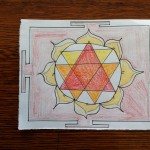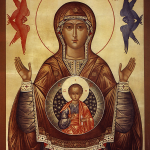This part of my testimony is all about graduate school, and it brings us up to the present. When we left off I had just moved to Berkeley, started work on my master’s degree, and broken up with my girlfriend. You can read parts one, two, and three by clicking the links.
I think I always knew I was going to end up in Berkeley at the Graduate Theological Union. It had been on my radar for years. I liked the small school consortium and the ecumenical and interfaith make up of the place. It had a small Orthodox seminary with a chapel, and also had some of the most liberal Christian seminaries in the country. Liberal, but also academically respected. Rosemary Radford Ruether, pioneering feminist theologian, also taught there. I was very excited to dive deep into feminist theology.
And dive I did. I explored so many things. I bought my first tarot deck, something I’d been wanting to do for years but had been dissuaded by my ex-girlfriend. I read all kinds of new theologies. I started studying Latin. I loved most of my classes and, honestly? I could stay taking classes like those for the rest of my life. Nerd Niki was in heaven.
Emotionally and spiritually things were more complicated.
I still considered myself a Christian, although I recognized how ill-fitting the label was. I spent a year considering converting, officially, to Orthodoxy. I spent Tuesday evenings at the Orthodox Institute, attending services and fellowship (dinner and conversation). I was able to participate in readings and chanting (my first and only visit to the area Greek Orthodox church reminded me how rare it is to be able to participate like that). I felt welcomed despite my lack of ‘official’ status.
One of the things that I love about Orthodoxy is the lack of questions around ‘being saved.’ While most of the students attending services were ‘cradle Orthodox’, those born into the faith, many were also converts, and baptism is the act that yokes you to the Church. I’ve never been baptized, but I pondered it in my heart.
I felt more attached than ever to the Christian tradition. Attending services on Tuesday evenings at the Orthodox Institute, taking advanced theological classes, spending my days with other seminarians who were there to become priests and pastors, community organizers and activists, scholars and professors. Of course the more I found a potential fit, the more confused I was in general. One of the few times I went to chapel I had a vision of Athena standing at the altar, filling the entire vaulted space.
I was incredibly – and privately – judgmental about many of the people who arrived at school to be pastors. It seemed to me that those who sought to lead, inspire and heal others were the most in need of guidance, wisdom and healing themselves. Of course, only now do I recognize that perhaps those of there to study and perhaps someday contribute to the greater discourse might have been searching for wisdom and knowledge in an equally hungry and dysfunctional way. I know I was.
Still, I had a hard time feeling like I was on the same page with most of the Christians at seminary. I think I was so used to feeling like the odd one out and used to clinging to what I found liberating in the tradition that I never considered just walking away. Even after finding T Thorn Coyle’s book Evolutionary Witchcraft.
I was working part-time at a neighborhood bookstore. One day while tidying the shelves, I noticed a new book with an intriguing title. I pulled it off the shelf and read the flaps, the back, the table of contents, looked through the notes and index, and skimmed the introduction (isn’t that how you check out a new book? no?). I bought the book and took it home with me. I read the whole thing, then went back and worked through the exercises. Here was an approach to witchcraft that I could relate to. There was no polarity or gender essentialism. I liked that while ritual was part of the work, the way magic was described was not as some mystical gift that you discovered on your 13th birthday, but as a tool that one could hone and use. My queer, feminist, practical heart was pleased, as was my mystery loving, devout soul. After I discovered that Thorn lived in San Francisco, I emailed her and asked if she spoke or taught in the area. Yes, but not right now, was the reply; she’d put me on her mailing list.
And so I continued on with my work. I wrote my master’s thesis, mainly a literature review of white,* contemporary, feminist writing on the Virgin Mary. That process was a struggle, a dark night of the soul. I remember little of the three months I spent writing: 16 hour days in front of my laptop, double and triple checking my notes and sources, freaking out, fearing I had nothing to say, and what did any of this matter anyway? In the end, my thesis isn’t that great, but I passed and got my degree and moved on, with one eye to possibly going back to school to work on a PhD.
I found a job with a Bay Area adult Jewish education non-profit. I loved it. To someone raised secular and in what feels like at times, a rather tradition-less, white-bread non-culture, the rich tapestry of the Jewish world was inviting. I grew up with several Jewish friends and have long loved much about Jewish culture. At one point I asked myself ‘why not Judaism?’ There are so many things to love about Judaism. I particularly like its long tradition of questioning – questioning scripture, tradition and God Himself. But that last piece is part of my inability to embrace Judaism: I’m not a fan of Yahweh (or YHWH or G-d). I also realized that the narrative of Judaism is not my story. I remain a committed and loving friend of the Jewish tradition (and according to my former boss – and totally tongue-in-cheek here – an honorary Jew).
Realizing that piece about one’s narrative tradition was an eye opener for me. It’s helped me also see that while much of my own personal journey has followed along the Christian path, often times right along with it, the Christian narrative isn’t mine either. But I still didn’t see that clearly then.
About two years after reading Thorn’s book, I finally got an email saying that she would be teaching a two-year class on Feri witchcraft, using her book as a basis for the structure. I, and my then-fiance (now husband), signed up. I think there were 32 people initially, whittling down to about 23 or so by the end. This was my first ‘real’ forray into formal paganism of any kind – I still identified as a Christian! My love of the Virgin Mary was the only thing keeping me there, but still I clung to the claim. While many participants came to Feri and/or Paganism from a Christian background, now long rejected, no one ever dismissed my claims or experience. No one ever outwardly judged me. I felt very welcome.
What I struggled with was ritual. The theory, the personal work, the strong emphasis on personal practice – all that was welcome. But group ritual? I was profoundly uncomfortable. Chanting? Singing? Trance work? In ‘public’? I was freaked out. I look back and I realize that there were a few personalities and ‘performance styles’ that clashed intensely with mine. These days those things would be less of a problem, but starting out, with my issues of personal spiritual expression and performance anxiety…. it was a hot mess for me. I didn’t get much out of the rituals and mostly thought that they were psychological exercises.
After the two years were up, I felt changed. More open. More confident. Part of a larger, if amorphous, community. I felt I had connected with something – even if I was just touching the fringe on a great train of a cloak, like the woman being healed by touching the hem of Jesus’s tunic…. Early on in the training I remember thinking ‘This is great, but Feri isn’t for me.’ At the end of it, I wanted more. Feri was for me. But I wasn’t sure quite how. I was pregnant with my first child during the second half of the Feri training. He arrived just 8 weeks before the final gathering. Juggling new motherhood, work and a new degree program took up a lot of my energy.
During this time I was also getting more and more involved in yoga. I’d had my first yoga class when I was living in Seattle. It was mainly Iyengar style. I liked it a lot, and I incorporated a lot of what I’d learned into my own daily stretching and workouts. When I moved to Oakland after grad school the neighborhood studio had a woman teaching Anusara** style yoga and I loved it. In fact, much of the metaphysics sounded a lot like Feri to me.
Yoga and Feri were more and more the realities of my spiritual practice and informed how I viewed the world. Still, I did not take them on as identities. I clung to the last remaining shreds of a Christian identity. When our son was 7 months old my husband and I went on our first ever vacation together. We were in Australia visiting my family (my mother is Australian). My parents and sister had my son for the weekend. Husband and I were driving off to Daylesford in Victoria, talking about life and what to do next. We couldn’t stay in the Bay Area and raise kids – too expensive, not enough trees. I had recently started a PhD program through a university in Wales. My adviser was one of the few feminist theologians specializing in Mary and she was the only one I wanted to study with. What to do? Where to go?
In the midst of the discussion about what things we needed in a community, my husband turned to me and said, ‘Let’s move to Wales.’ It was like a bolt of inspiration from gods. We both recognized the sheer insanity of it, but also the odd ‘rightness’ of it. While in Daylesford we both got tarot readings – separately and by different people. Both readers commented on our up coming move abroad. Neither of us had said anything to anyone about this decision. Nine months later, almost to the day, we arrived in Wales. We’d sold or given away almost everything we owned. We’d scraped together the $10,000 for moving costs, plane tickets, and visas. And there we were. In rural Wales. We’d followed the voice of God and …… it led us into the verdant wilderness. Which will be the subject of part five.
Holy cow, five parts. Thanks for reading!
*White, because I am not fluent in Spanish, and so much of Latin America’s writing on Mary is inaccessible to me, and because there is little written about her in the African-American Christian tradition or in other cultures. Most of the writing on Mary comes from white European or white American writers (or if they’re not white, they are not writing in a racially intersectional way, which defaults to white, at this point). To include other cultures and a wider discussion on race within the theological discussion of Mary would have made my masters thesis unruly and way too long.
**Anusara is in the middle of a huge ‘scandal’ and upheaval. You can google it for yourself. I still think the system has much to offer and I continue to practice in this style, while also being deeply disappointed by what has unfolded.











